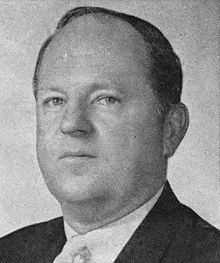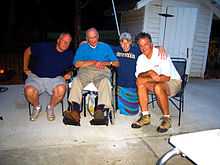William Jennings Bryan Dorn
| William Jennings Bryan Dorn | |
|---|---|
 | |
| Member of the U.S. House of Representatives from South Carolina's 3rd district | |
| In office January 3, 1951 – December 31, 1974 | |
| Preceded by | James Butler Hare |
| Succeeded by | Butler Derrick |
| In office January 3, 1947 – January 3, 1949 | |
| Preceded by | Butler B. Hare |
| Succeeded by | James Butler Hare |
| Chairman of the House Veterans' Affairs Committee | |
| In office January 3, 1973 – January 3, 1975 | |
| Preceded by | Olin E. Teague |
| Succeeded by | Ray Roberts |
| Member of the South Carolina Senate from Greenwood County | |
| In office January 14, 1941 – June 20, 1942 | |
| Member of the South Carolina House of Representatives from Greenwood County | |
| In office January 10, 1939 – June 8, 1940 | |
| Personal details | |
| Born | April 14, 1916 Greenwood County, South Carolina |
| Died | August 13, 2005 (aged 89) Greenwood, South Carolina |
| Political party | Democratic |
| Spouse(s) | Mildred Johnson |
| Military service | |
| Allegiance | |
| Service/branch | United States Army Air Corps |
| Years of service | 1942 – 1945 |
| Rank | |
| Battles/wars | World War II European Theater |
William Jennings Bryan Dorn (April 14, 1916 – August 13, 2005) was a United States politician from South Carolina who represented the western part of the state in the United States House of Representatives from 1947 to 1949 and from 1951 to 1975 as a Democrat.
Dorn, named after William Jennings Bryan, was elected to the South Carolina House of Representatives in 1938 and to the South Carolina Senate in 1940. He served in the Army Air Force in Europe during World War II.
Dorn was first elected to Congress in the 1946 election. In the 1948 election, he unsuccessfully ran for the United States Senate seat that was later held by Strom Thurmond.

Dorn returned to the House in the 1950 election. Dorn was known for his work on issues related to the military and civil rights. In 1966, journalist Drew Pearson reported that Dorn was one of a group of Congressman who had received the "Statesman of the Republic" award from Liberty Lobby for his "right-wing activities".[1] He left Congress to run for Governor of South Carolina in 1974. He lost the Democratic primary to Charles D. Ravenel, who was soon ruled ineligible on residency grounds required by the state constitution. A special state convention then chose Dorn as the Democratic candidate. He was defeated in the general election by Republican James B. Edwards, one of the few disappointments in what was generally a big year for Democrats. In 1978, Dorn again sought the Democratic nomination for Governor but was eliminated in a three way race won by Richard Riley. In 1980, he was elected chairman of the South Carolina Democratic Party.
Autobiography
- Dorn, William Jennings Bryan, and Scott Derks. Dorn: Of the People, A Political Way of Life. Columbia and Orangeburg, S.C.: Bruccoli Clark Layman/Sandlapper Publishing, 1988
References
- ↑ Pearson, Drew (November 2, 1966). "Judge Rules Against Liberty Lobby". The Free Lance-Star (Fredericksburg, Virginia). p. 6. Retrieved December 14, 2014.
External links
- AP obituary
- William Jennings Bryan Dorn at Find a Grave
- William Jennings Bryan Dorn at the Biographical Directory of the United States Congress
- A film clip "Longines Chronoscope with William Jennings Bryan Dorn" is available for free download at the Internet Archive
- William Jennings Bryan Dorn: In His Own Words Audio clips from the Papers of William Jennings Bryan Dorn at South Carolina Political Collections
| United States House of Representatives | ||
|---|---|---|
| Preceded by Butler B. Hare |
Member of the U.S. House of Representatives from South Carolina's 3rd congressional district 1947-1949 |
Succeeded by James Butler Hare |
| Preceded by James Butler Hare |
Member of the U.S. House of Representatives from South Carolina's 3rd congressional district 1951-1974 |
Succeeded by Butler Derrick |
| ||||||||
|
